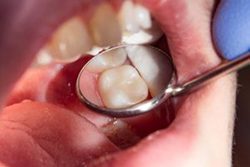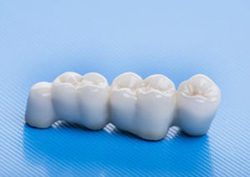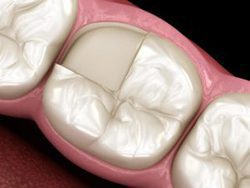Thorough Restorative Dentistry in Pasco, WA
It’s great news that the incidence of tooth decay has significantly diminished over the years due to the use of fluorides and an increase in patient awareness. However, teeth are still susceptible to decay, infection, and breakage and sometimes need to be restored back to health. Through improved techniques and modern technology, we are now able to offer more options for restoring a tooth back to its normal shape, appearance and function.
Should your teeth ever require a restorative treatment, you can rest assured knowing we will always discuss with you the available options, and recommend what we believe to be the most comfortable and least invasive treatment. Providing you with excellent care is our number one priority when creating your beautiful smile.
Reasons for and Benefits of Restorative Dentistry:
- Enhance your smile
- Fill in unattractive spaces between teeth
- Improve or correct an improper bite
- Prevent the loss of a tooth
- Relieve dental pain
- Repair damaged and decayed teeth
- Replace missing teeth
- Replace old, unattractive dental treatments
- Restore normal eating and chewing
Remember to give your teeth the attention they need today!

A composite (tooth colored) filling is used to repair a tooth that is affected by decay, cracks, fractures, etc. The decayed or affected portion of the tooth will be removed and then filled with a composite filling.
There are many types of filling materials available, each with their own advantages and disadvantages. You and your dentist can discuss the best options for restoring your teeth. Composite fillings, along with silver amalgam fillings, are the most widely used today. Because composite fillings are tooth colored, they can be closely matched to the color of existing teeth, and are more aesthetically suited for use in fReasons for composite fillingsront teeth or the more visible areas of the teeth.
As with most dental restorations, composite fillings are not permanent and may someday have to be replaced. They are very durable, and will last many years, giving you a long lasting, beautiful smile.
Reasons for composite fillings
- Chipped teeth
- Closing space between two teeth
- Cracked or broken teeth
- Decayed teeth
- Worn teeth
How are composite fillings placed?
Composite fillings are usually placed in one appointment. While the tooth is numb, your dentist will remove decay as necessary. The space will then be thoroughly cleaned and carefully prepared before the new filling is placed. If the decay was near the nerve of the tooth, a special medication will be applied for added protection. The composite filling will then be precisely placed, shaped, and polished, restoring your tooth to its original shape and function.
It is normal to experience sensitivity to hot and cold when composite fillings are first placed, however this will subside shortly after your tooth acclimates to the new filling.

Dental implants are a great way to replace missing teeth and also provide a fixed solution to having removable partial or complete dentures. Implants provide excellent support and stability for these dental appliances.
Dental implants are artificial roots and teeth (usually titanium) that are surgically placed into the upper or lower jaw bone by a dentist or Periodontist – a specialist of the gums and supporting bone. The teeth attached to implants are very natural looking and often enhance or restore a patient’s smile!
Dental implants are very strong, stable, and durable and will last many years, but on occasion, they will have to be re-tightened or replaced due to normal wear.
Reasons for dental implants
- Replace one or more missing teeth without affecting adjacent teeth
- Resolve joint pain or bite problems caused by teeth shifting into missing tooth space
- Restore a patient’s confident smile
- Restore chewing, speech, and digestion
- Restore or enhance facial tissues
- Support a bridge or denture, making them more secure and comfortable
What does getting dental implants involve?
The process of getting implants requires a number of visits over several months.
X-rays and impressions (molds) are taken of the jaw and teeth to determine bone, gum tissue, and spacing available for an implant. While the area is numb, the implant will be surgically placed into the bone and allowed to heal and integrate itself onto the bone for up to six months. Depending on the type of implant, a second surgery may be required in order to place the “post” that will hold the artificial tooth in place. With other implants the post and anchor are already attached and placed at the same time.
After several weeks of healing the artificial teeth are made and fitted to the post portion of the anchor. Because several fittings may be required, this step may take one to two months to complete. After a healing period, the artificial teeth are securely attached to the implant, providing excellent stability and comfort to the patient.

A denture is a removable dental appliance replacement for missing teeth and surrounding tissue. They are made to closely resemble your natural teeth and may even enhance your smile.
There are two types of dentures – complete and partial dentures. Complete dentures are used when all of the teeth are missing, while partial dentures are used when some natural teeth remain. A Partial denture not only fills in the spaces created by missing teeth, it prevents other teeth from shifting.
A Complete denture may be either “conventional” or “immediate.” A conventional type is made after the teeth have been removed and the gum tissue has healed, usually taking 4 to 6 weeks. During this time the patient will go without teeth. Immediate dentures are made in advance and immediately placed after the teeth are removed, thus preventing the patient from having to be without teeth during the healing process. Once the tissues shrink and heal, adjustments will have to be made.
Dentures are very durable appliances and will last many years, but may have to be remade, repaired, or readjusted due to normal wear.
Reasons for dentures
- Complete Denture – Loss of all teeth in an arch
- Partial Denture – Loss of several teeth in an arch
- Enhancing smile and facial tissues
- Improving chewing, speech, and digestion
What does getting dentures involve?
The process of getting dentures requires several appointments, usually over several weeks. Highly accurate impressions (molds) and measurements are taken and used to create your custom denture. Several “try-in” appointments may be necessary to ensure proper shape, color, and fit. At the final appointment, your dentist will precisely adjust and place the completed denture, ensuring a natural and comfortable fit.
It is normal to experience increased saliva flow, some soreness, and possible speech and chewing difficulty, however this will subside as your muscles and tissues get used to the new dentures.

A crown (or cap) is a covering that encases the entire tooth surface restoring it to its original shape and size. A crown protects and strengthens tooth structure that cannot be restored with fillings or other types of restorations.
Although there are several types of crowns, porcelain (tooth colored crown) are the most popular, because they resemble your natural teeth. They are highly durable and will last many years, but like most dental restorations, they may eventually need to be replaced. Porcelain crowns are made to match the shape, size, and color or your teeth giving you a natural, long-lasting beautiful smile.
Reasons for crowns
- Broken or fractured teeth
- Cosmetic enhancement
- Decayed teeth
- Fractured fillings
- Large fillings
- Tooth has a root canal
What does getting a crown involve?
A crown procedure usually requires two appointments. Your first appointment will include taking several highly accurate molds (or impressions) that will be used to create your custom crown. A mold will also be used to create a temporary crown which will stay on your tooth for approximately two weeks until your new crown is fabricated by a dental laboratory.
While the tooth is numb, the dentist will prepare the tooth by removing any decay and shaping the surface to properly fit the crown. Once these details are accomplished, your temporary crown will be placed with temporary cement and your bite will be checked to ensure you are biting properly.
At your second appointment your temporary crown will be removed, the tooth will be cleaned, and your new crown will be carefully placed to ensure the spacing and bite are accurate.

A dental bridge is a fixed (non-removable) appliance and is an excellent way to replace missing teeth.
There are several types of bridges. You and your dentist will discuss the best options for your particular case. The “traditional bridge” is the most popular type and is usually made of porcelain fused to metal. Porcelain fixed bridges are most popular because they resemble your natural teeth. This type of bridge consists to two crowns that go over two anchoring teeth (abutment teeth) and are attached to pontics (artificial teeth), filling the gap created by one or more missing teeth.
Dental bridges are highly durable and will last many years, however they may need replacement or need to be re-cemented due to normal wear.
Reasons for a fixed bridge
- Fill space of missing teeth
- Maintain facial shape
- Prevent remaining teeth from drifting out of position
- Restore chewing and speaking ability
- Restore your smile
- Upgrade from a removable partial denture to a permanent dental appliance
What does getting a fixed bridge involve?
Getting a bridge usually requires two or more visits. While the teeth are numb, the two anchoring teeth are prepared by removing a portion of enamel to allow for a crown. Next, a highly accurate impression (mold) is made which will be sent to a dental laboratory where the bridge will be fabricated. In addition, a temporary bridge will be made and worn for several weeks until your next appointment.
At the second visit, your permanent bridge will be carefully checked, adjusted, and cemented to achieve a proper fit. Occasionally your dentist may only temporarily cement the bridge, allowing your teeth and tissue time to get used to the new bridge. The new bridge will be permanently cemented at a later time.

An inlay restoration is a custom made filling made of composite material, gold, or tooth-colored porcelain. Porcelain inlays are popular because they resemble your natural tooth. A porcelain inlay is made by a professional dental laboratory and is permanently cemented into the tooth by your dentist. An onlay restoration is a custom made filling made of composite material, gold, or tooth-colored porcelain. Porcelain onlays are popular because they resemble your natural tooth. An onlay is sometimes also referred to as a partial crown. Porcelain onlays are made by a professional dental laboratory and is permanently cemented onto the tooth by your dentist.
Porcelain Inlays
An inlay restoration is a custom made filling made of composite material, gold, or tooth-colored porcelain. Porcelain inlays are popular because they resemble your natural tooth. A porcelain inlay is made by a professional dental laboratory and is permanently cemented into the tooth by your dentist.
Inlays can be utilized to conservatively repair teeth that have large defective fillings or have been damaged by decay or trauma. Inlays are an ideal alternative to conventional silver and composite fillings. Also, they are more conservative than crowns because less tooth structure is removed in the preparation of inlays.
As with most dental restorations, inlays are not always permanent and may someday require replacement. They are highly durable and will last many years, giving you a beautiful long lasting smile.
Reasons for inlay restorations
- Broken or fractured teeth
- Cosmetic enhancement
- Decayed teeth
- Fractured fillings
- Large fillings
What does getting an inlay involve?
An inlay procedure usually requires two appointments. Your first appointment will include taking several highly accurate impressions (molds) that will be used to create your custom inlay and a temporary restoration.
While the tooth is numb, the dentist will remove any decay and/or old filling materials. The space will then be thoroughly cleaned and carefully prepared, shaping the surface to properly fit an inlay restoration. A temporary filling will be applied to protect the tooth while your inlay is made by a dental laboratory.
At your second appointment your new inlay will be carefully and precisely cemented into place. A few adjustments may be necessary to ensure a proper fit and that your bite is comfortable.
You will receive care instruction at the conclusion of your treatment. Good oral hygiene practices, a proper diet, and regular dental visits will aid in the life of your new inlay.
Porcelain Onlays
An onlay restoration is a custom made filling made of composite material, gold, or tooth-colored porcelain. Porcelain onlays are popular because they resemble your natural tooth. An onlay is sometimes also referred to as a partial crown. Porcelain onlays are made by a professional dental laboratory and is permanently cemented onto the tooth by your dentist.
Onlays can be utilized to conservatively repair teeth that have large defective fillings or have been damaged by decay or trauma. Onlays are an ideal alternative to crowns (caps) because less tooth structure is removed in the preparation of onlays. Onlays are essentially identical to inlays with the exception that one or more of the chewing cusps have also been affected and need to be included in the restoration.
As with most dental restorations, onlays are not always permanent and may someday require replacement. They are highly durable and will last many years, giving you a beautiful long lasting smile.
Reasons for onlay restorations
- Broken or fractured teeth
- Cosmetic enhancement
- Decayed teeth
- Fractured fillings
- Large fillings
What does getting an onlay involve?
An onlay procedure usually requires two appointments. Your first appointment will include taking several highly accurate impressions (molds) that will be used to create your custom onlay and a temporary restoration.
While the tooth is numb, the dentist will remove any decay and/or old filling materials. The space will then be thoroughly cleaned and carefully prepared, shaping the surface to properly fit an onlay restoration. A temporary filling will be applied to protect the tooth while your onlay is made by a dental laboratory.
At your second appointment, your new onlay will be carefully and precisely cemented into place. A few adjustments may be necessary to ensure a proper fit and that your bite is comfortable.
